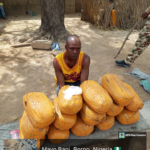If you’ve been online in the last 24 hours, you must have seen that trending video
FCT Minister Nyesom Wike is having a heated clash with some Nigerian soldiers over a land property in Abuja.
Now, most people are just laughing and dropping memes…
But if you truly understand money, you should be thinking deeply.
Because that single incident yesterday explains why banks in Nigeria no longer accept land or buildings as collateral, and why so many businesses are quietly dying.
As your Financial Literacy Advocate, let me break it down in plain language
Imagine:
Mama Ngozi owns a piece of land in Abuja.
She built a nice plaza on it and has tenants paying her rent every month.
One day, she goes to the bank to get a ₦200 million loan to expand her business.
She submits her land documents as collateral.
The bank officer smiles and says:
“Madam, we can’t take this land o… what if the government revokes it tomorrow?”
Mama Ngozi laughs, “Ah! How can the government revoke my land when I have a C of O?”
But just yesterday, we all saw what happened.
The FCT Minister drove down to revoke a land, and soldiers stood their ground to defend it.
Both parties claimed “ownership”.
Now imagine if that same land was already used as collateral in a bank…
Tomorrow, the government can wake up and say this land belongs to them or to the military, or it was wrongly allocated, or it’s under revocation.
The moment that happens, that land becomes worthless paper.
And guess what?
The bank loses.
The business owner loses.
The economy loses.
That’s exactly why most Nigerian banks have stopped accepting landed properties as collateral, especially in Abuja and Lagos.
The risk is simply too high.
Sit down, let me mentor you on the implications you’re Not Seeing
Every time a government revokes land, cancels allocations, or disputes ownership, it quietly destroys:
- Business confidence
- Access to credit for entrepreneurs
- Investor trust in real estate
When land ownership is unstable, the economy loses its foundation.
Because land is supposed to be the strongest form of collateral, but in Nigeria today, it has become the weakest.
Now that you get it….
As your Financial Literacy Advocate, it’s my duty to educate you on What Smart Investors Are Doing Now
Rich people don’t wait for the system to frustrate them; they adapt.
Instead of using land as collateral, they are now using financial instruments like:
- Government Bonds
- Treasury Bills
- Eurobonds
- Commercial Papers
- Mutual Funds and Equities
These assets are recognized globally.
Their ownership can’t be revoked by any government minister or soldier.
And when you walk into a bank with ₦100 million worth of Federal Government Bonds, the bank manager will stand up to shake your hand, because your bond is a risk-free asset.
Land is visible wealth,
But financial instruments are transferable power.
The poor still measure wealth by “how many plots” they own,
But the rich measure wealth by what they can liquidate in seconds, not what they must fight the government to defend.
So next time you see Wike and a soldier fighting over land, don’t just scroll past and laugh.
Look deeper.
Because that video is not just politics, it’s a reflection of the fragility of our collateral system.
And that, my friend, is why financial literacy is no longer optional.
In a country where the government can revoke land overnight,
The smartest collateral you can hold is trust-backed, government-guaranteed assets, not land certificates.
The rich already understand this.
The question is, will you learn before it’s too late?
-Copied



